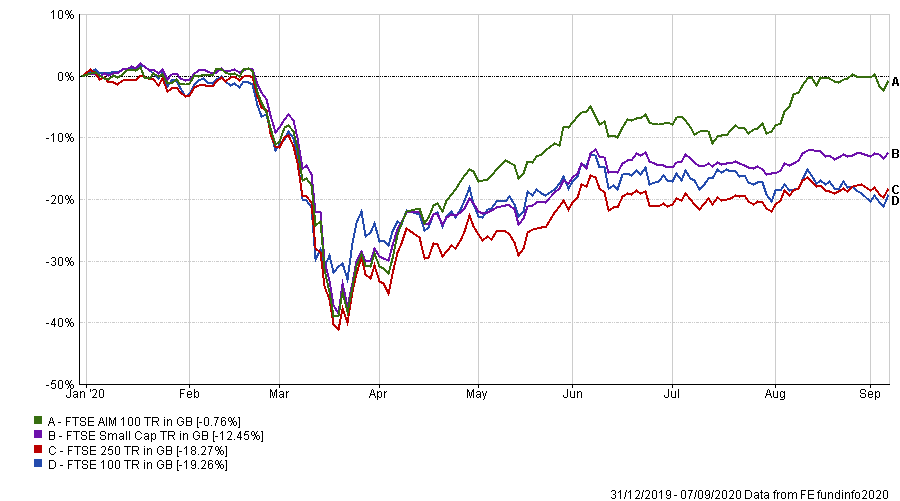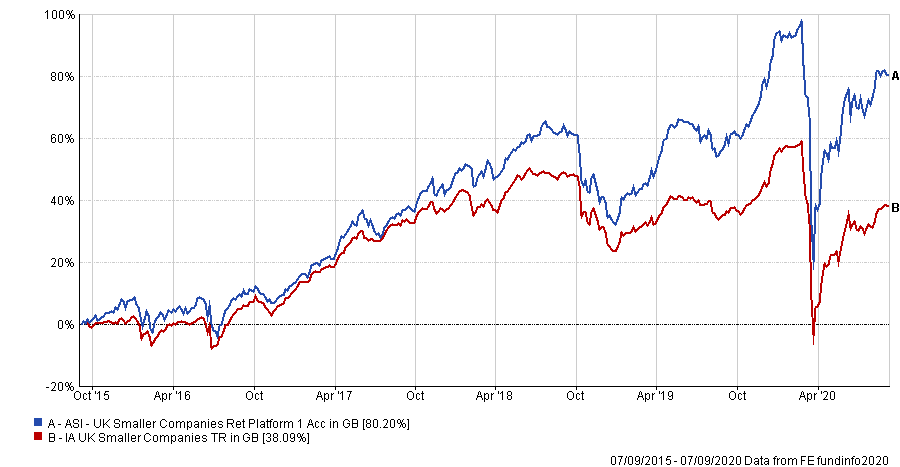While most UK markets remain firmly in negative territory there is one area that has rallied almost completely unnoticed, according to Aberdeen Standard Investments’ Harry Nimmo.
Having started the year at high levels following a decisive general election result that removed much of the uncertainty surrounding Brexit, the main UK indices have posted significant losses year-to-date.
But there has been one market that has gone largely unnoticed by many UK investors and is now almost back to where it was at the start of the year: the Alternative Investment Market (AIM).
Performance of UK indices YTD

Source: FE Analytics
While the blue-chip FTSE 100 index is down by one-fifth since the start of the year, AIM has recorded a small loss of just 0.76 per cent in 2020.
“So, year-to-date, AIM stocks have done around 20 per cent better than the listed stocks [on the main market],” Nimmo said. “And I think that a lot of people have completely missed that.” 
AIM, the junior market of the London Stock Exchange, is designed to help smaller companies access capital from the public market to fuel the company’s growth. Launched in 1995 with just 10 companies at an aggregate value of £82m, today the market hosts around 850 companies, which have raised over £115bn during that time.
Nimmo said that one-third of his £1.7bn ASI UK Smaller Companies fund is invested in AIM stocks.
The manager said part of the reason why AIM has seen this outperformance compared to stocks on the main market is that it is a growth-oriented sector with “a fair amount of internet and cloud computing technology stocks”.
These stocks have been major beneficiaries from the coronavirus lockdown and have significantly rallied in recent months as people and companies have relied on the resources to continuing working and communicating during the crisis.
“A lot of these stocks have done really well,” he explained. “AIM is miles ahead and these are big companies as well, £1bn businesses.”
Nevertheless, it has been a difficult time for the UK stock market, which have continued to lag their international peers having taken longer to lock down when the coronavirus hit and with renewed uncertainty over Brexit.
Compared to other developed and emerging market peers the UK is trailing in the coronavirus rally.
However, Nimmo said this is a good time to be moving into UK smaller companies because the market is reaching a “turning point” for the better as it moves into the post-recession recovery phase.
The UK entered its worst recession on record this year, according to data from the Office for National Statistics (ONS), with GDP falling by 22.1 per cent during the first half of the year, more than double the fall seen in the US.
However, the ONS data also indicated that the worst may have already passed, with the economy growing by 8.7 per cent in June.
And if the UK is already in its recovery period then this will be Nimmo’s “turning point” moment for UK smaller companies.
“In terms of market timing, it isn’t a bad time to invest in smaller companies,” he said. “Smaller companies normally underperform on their way into a downturn and that’s certainly happened over the past two years across the world.
“It happened in the banking crisis and it happened in – to an extent – with the tech bubble.”
The fund manager continued: “It’s because they’re on the whole, particularly the more traditional ones, they are more cyclical than large caps.
“So [they] get hit harder in the pre-turning point phase [but] they actually recover more sharply after the turning point.
“I’m postulating, but the turning point was actually 19 March this year and we’re past the turning point. So, when the updraft comes smaller companies tend to do better in that phase.”
However, Nimmo warned that his ASI UK Smaller Companies fund will underperform at certain points in the UK small-caps rally and it will happen during what he calls the “dash for trash” period.
“There will be at some stage this ‘dash for trash’ phase, where all the most bombed-out companies suddenly start to do well when it’s blatantly obvious that there’s going to be a recovery,” he explained. “It happened in 2009 between March and August.”
These ‘bombed-out’ companies won’t be found in the ASI UK Smaller Companies fund, said Nimmo, and that’s largely because of Matrix– the asset manager’s proprietary quantitative tool.
The tool helps Nimmo find the companies with high-quality characteristics operating in growth markets and with positive business momentum.
Matrix scores and ranks companies based on 13 factors – including quality, earnings growth, momentum and valuation. These factors can help predict share price performance. Each company is then given a score.
This process steers him away from the low-scoring cyclical companies which are likely to perform well during the ‘dash for trash’ rally.
In 2009 when this last occurred, Nimmo said his fund lagged the IA UK Smaller Companies benchmark by around 13 per cent, “which under most circumstances [is] a pretty dire result for a fund manager”. Although his fund was up around 32 per cent at the end of that year.
Nimmo said this isn’t bad news for his fund or its investors because the ‘dash for trash’ is short-lived.
“Our clients take the view that we rather you provided us with resilience at the difficult markets positions,” he noted, such as during the coronavirus crisis where the fund has held up against its IA UK Smaller Companies peers.
“And if markets suddenly take off [and] you’re suddenly behind, you’re still ahead in absolute terms and ahead 32 per cent [like in 2009] and that’s a pretty good result,” he said.
Performance of fund vs sector over 5yrs

Source: FE Analytics
ASI UK Smaller Companies fund is Nimmo’s flagship fund which he has run since 1997 and over the past five years has made a total return of 80.20 per cent, beating the IA UK Smaller Companies sector (38.09 per cent).
The five FE fundinfo Crown-rated fund has an ongoing charges figure (OCF) of 0.99 per cent.





